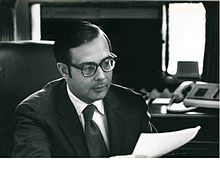- Clay T. Whitehead
-
Clay T. "Tom" Whitehead (November 13, 1938 – July 23, 2008) was a United States government official who served as director of the White House Office of Telecommunications Policy from 1970 to 1974, during the Nixon administration. He pioneered a policy of competition in the telecommunications industries, which later was reflected in legislation and regulations in the United States and around the world.[1][2][3]
Contents
Life and career
Whitehead was born in Neodesha, Kansas. He attended Massachusetts Institute of Technology, earning his undergraduate and master's degrees in electrical engineering, and a Ph.D. in management in 1967.
Before joining the Nixon campaign in 1968 as an expert on budget policies, Whitehead was a RAND Corporation economist.[3]
Nixon administration
Between 1969 and 1970, Whitehead served as Special Assistant to President Richard Nixon. In this capacity, he crafted an “Open Skies” domestic satellite policy that allowed any qualified private company to launch communications satellites, thereby rejecting the monopoly model for the technology.[4][5][6]
The policy enabled cable television networks like C-SPAN, CNN, and HBO to prosper and created a ripple effect that ultimately led to sweeping and lasting changes in the telecommunications landscape.[1][2][3]
In 1970, Whitehead helped create the White House Office of Telecommunications Policy (OTP), which he was then asked to lead.[1][3]
One of OTP’s accomplishments included ending the regulatory freeze on the infant cable industry, which then permitted it to compete with television broadcasting and, eventually, the established telephone industry.[3]
Whitehead’s policies also impacted broadcasting directly. “He was credited with formulating policies that gave more autonomy to local stations in the public broadcasting system, which was seen by some PBS executives as an attack on the service in large part because of Dr. Whitehead's early reputation for antagonizing the press.” [1]
In a noted 1972 speech, Whitehead used the terms "elitist gossip" and "ideological plugola" to echo the Nixon administration's claims of liberal bias in network news.[3] Walter Cronkite claims in his memoir that Whitehead suggested to affiliate stations that they need not carry network news reports such as Cronkite's, and instead could rely on wire dispatches.[7]
In 1974, Whitehead was one of five men to secretly plan Vice President Gerald Ford's transition to the Presidency before Nixon’s resignation.[3][8][9]
Hughes Communications
After his career at OTP, Whitehead joined Hughes Aircraft and started the Hughes Communications subsidiary that launched the Galaxy satellite system, one of the first geostationary satellites.[3][6][10] The Galaxy business became the model for satellite television distribution and broadcasting around the world.[11]
SES Astra
Whitehead left Hughes in 1983 and founded the first private satellite business in Europe.[1][3][6] Now known as SES Astra, it replaced government-run television and grew tremendously to become one of the continent’s most profitable satellite systems and, according to Wikipedia, the largest fixed satellite operator in the world.[1][12]
George Mason University School of Law
In 2005, Whitehead was a Distinguished Visiting Professor of Communications Policy at George Mason University School of Law.[13]
References
- ^ a b c d e f Bernstein, Adam (2008-08-02). "Clay 'Tom' Whitehead, 69; Nixon's telecom advisor revolutionized cable TV industry". The Los Angeles Times. http://www.latimes.com/news/obituaries/la-me-whitehead2-2008aug02,0,5736294.story. Retrieved 2008-08-02.
- ^ a b Garvin, Glenn (2008-08-03). "His Ideas Launched the Future". Miami Herald.
- ^ a b c d e f g h i Hevesi, Dennis (2008-07-31). "Clay T. Whitehead, guide of policy that helped cable TV, is dead at 69". The New York Times. http://www.nytimes.com/2008/07/31/washington/31whitehead.html. Retrieved 2008-08-02.
- ^ "Whitehead Gets New Position". The Washington Post, Times Herald. 1970-06-27.
- ^ "White House Asks Open F.C.C. Policy on Use of Space". The New York Times. 1970-01-24.
- ^ a b c Virginia House Joint Resolution No. 995 (2009-02-28). "Celebrating the Life of Clay T. Whitehead". https://leg1.state.va.us/cgi-bin/legp524.exe?091+ful+HJ995ER. Retrieved 2009-04-15.
- ^ A Reporter's Life, Walter Cronkite, p. 223
- ^ Paul, Lewis (2001-05-24). "Philip W. Buchen, 85, Is Dead; Advised Ford on Nixon Pardon". The New York Times. http://query.nytimes.com/gst/fullpage.html?res=9F05E2DF113DF937A15756C0A9679C8B63. Retrieved 2008-11-22.
- ^ The other men were Philip Buchen, Brian Lamb, Lawrence Lynn, and Johnathan Moore. Paul, Lewis. (2001-05-24). "Philip W. Buchen, 85, Is Dead; Advised Ford on Nixon Pardon." The New York Times.
- ^ http://www.astronautix.com/project/galaxy.htm
- ^ "Hall of Fame 2005: Dr. Clay T. Whitehead". Society of Satellite Professionals. http://www.sspi.org/displaycommon.cfm?an=1&subarticlenbr=134. Retrieved 2009-04-07.[dead link]
- ^ "List of the largest fixed satellite operators". Wikipedia. http://en.wikipedia.org/wiki/List_of_the_largest_fixed_satellite_operators. Retrieved 2009-09-30.
- ^ "Former Distinguished Visiting Professor Whitehead Dies". Mason Gazette. 2008-08-01. http://gazette.gmu.edu/articles/12306/. Retrieved 2008-08-02.
External links
- Clay T. Whitehead via Society of Satellite Professionals International Hall of Fame
Categories:- 1938 births
- 2008 deaths
- People from Wilson County, Kansas
Wikimedia Foundation. 2010.

